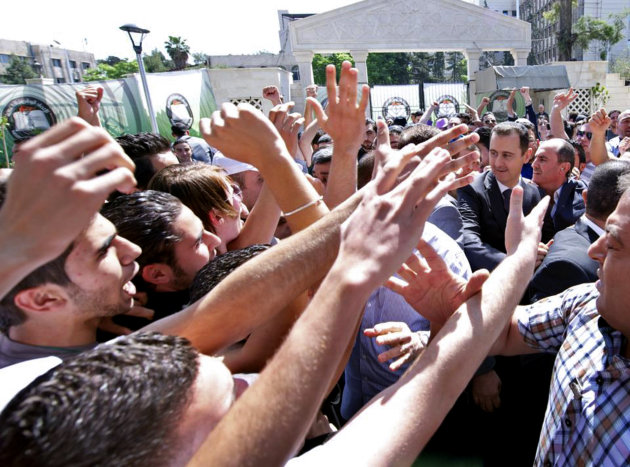Israel declined to comment, but Syria accused the Jewish state of carrying out a raid on a military facility just north of the capital.
The explosions came soon after an Israeli official confirmed his country had carried out an air strike earlier in the week targeting missiles in Syria intended for the Lebanese militant group Hezbollah.
The target of Sunday's attack, according to Syrian media, was the same Jamraya military research center which was hit by Israel in another assault in January. Jamraya, on the northern approaches to Damascus, is just 15 km (10 miles) from the Lebanese border.

President Assad on 4 May visited Damascus University for the inauguration of a statue dedicated to the 'martyrs of Syrian universities'. It was his second public appearance in a week. He was greeted warmly by a large number of supporters.
Video footage uploaded onto the Internet by activists showed a series of explosions. One lit up the skyline over the city, while another sent up a tower of flames and secondary blasts.
The Western intelligence source told Reuters Israel carried out the attack and the operation hit Iranian-supplied missiles which were en route to Hezbollah. "In last night's attack, as in the previous one, what was attacked were stores of Fateh-110 missiles that were in transit from Iran to Hezbollah," the source said.
The British-based Syrian Observatory for Human Rights saidthe blasts hit Jamraya as well as a nearby ammunition depot. Other activists said a missile brigade and two Republican Guard battalions may also have been targeted in the heavily militarized area just north of Damascus.
Syria's state television said the strikes were a response to recent military gains by President Bashar al-Assad's forces against rebels. "The new Israeli attack is an attempt to raise the morale of the terrorist groups which have been reeling from strikes by our noble army," it said.
Uzi Rubin, an Israeli missile expert and former defense official said the Fateh-110 missile "is better than the Scud, it has a half-ton warhead". Iran has said it adapted the missile for anti-ship use by installing a guidance system, he added.


.jpg)


No comments:
Post a Comment